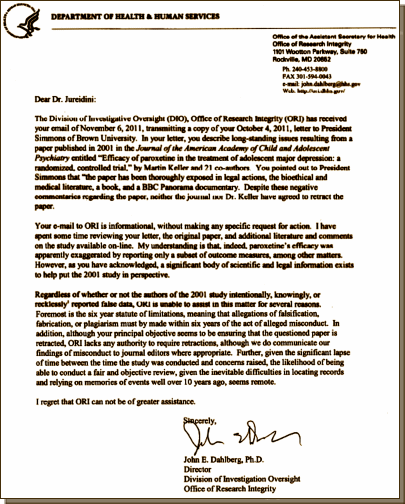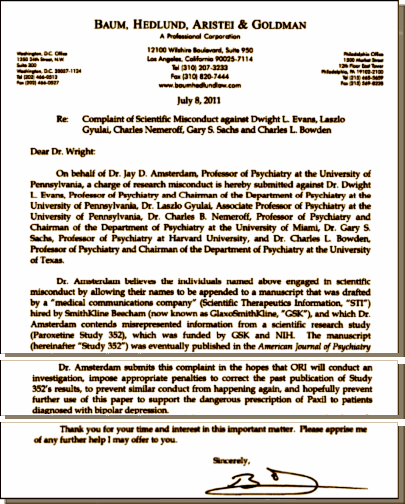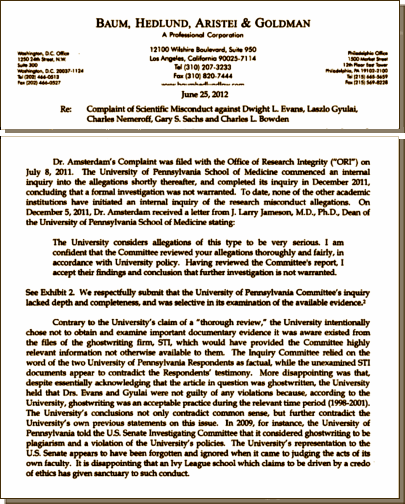- go pogo…
- closer to becoming indelible…
- back on the front burner…
- paxil study 352 revisited…
- paxil study 352 – what’s ghost-writing?
- paxil study 352 – more about ghost-writing…
- paxil study 352: plausible deniability…
- comment
[Click on the graphics below to link to the full text of the letters]
A year ago, the Office of Research Integrity [ORI] at NIH/HHS turned down Healthy Skepticism’s request that they review Paxil Study 329. They gave several reasons – a six year statute of limitations, a lack of authority to request a retraction, and the concern that the age of the study would mean that they couldn’t do a fair investigation. While the statute of limitations seems reasonable, the notion of missing data seems ill informed. There are enough documents scattered around the Internet from previous legal discovery to more than prove the allegations.
Last Summer, Dr. Jay Amsterdam [author of The paroxetine 352 bipolar trial: A study in medical ghostwriting] filed a similar complaint with the ORI about Paxil Study 352.
Supported by NIMH grant MH-51761 and a grant from GlaxoSmithKline.
U. of Pennsylvania Absolves Psychiatry Chairman of Ghostwriting Complaint
Chronicles of Higher Education
by Paul Basken
February 29, 2012
The University of Pennsylvania has concluded that the chairman of its psychiatry department and a colleague let their names be listed among the authors reviewing a medicine in a journal article that was actually written by the drug’s manufacturer. The university, however, has decided to take no punitive action against the chairman, Dwight L. Evans, and an associate professor of psychiatry, Laszlo Gyulai, for the 2001 article in The American Journal of Psychiatry. Penn noted…
The University of Pennsylvania has denied allegations made by one of its professors that several other academics – including his department chair – allowed their names to be added to a medical journal manuscript, but gave control of the contents to GlaxoSmithKline, according to his attorney. The study, which was funded by the drugmaker and the National Institutes of Health, looked at the impact of the Paxil antidepressant on patients with bipolar disorder.
At the same time, the university has acknowledged a claim by the professor, Jay Amsterdam, that the 2001 study was ghostwritten by Scientific Therapeutics Information, his attorney tells us. However, he says the university is not planning on taking any action in connection with the ghostwriting. The study, which was published by the American Journal of Psychiatry [see here], did not mention that STI played any role [here is an email in which STI employee Sally Laden discusses that she would work on the paper].
“They said his allegations were not meritorius, although they did find that the publication at issue was ghostwritten,” says Bijan Esfandiari, the attorney, citing a letter and other documents he received from the university. “They acknowledged that a marketing firm was involved in drafting, and everything associated with, the issue. But in response to our complaint, they said that, at the time these events took place, which was between 1998 and 2001, ghostwriting was standard practice and everyone was doing this, so therefore, we’re not going to punish any individuals”…
The Office of Research Integrity in the National Institute of Health is the agency responsible for monitoring research conduct. Like any governmental agency, its history is complicated and over my head. I don’t know if the fact that Paxil Study 329 was not government funded had something to do with the ORI not initiating a full investigation. Paxil Study 352 did list NIMH funding in the article [along with GSK sponsorship]. The Grant [MH-51761] lists Dr. Nemeroff as the Principle Investigator.
The hardest thing for those of us on the outside to understand is how the rampant research misconduct in psychiatry spanning several decades involving highly placed academicians and pharmaceutical companies in alliance can have gone on without someone lowering the boom on it. The civil suits and DOJ investigations have increased recently, but the HHS/NIH/NIMH/ORI haven’t been a big players. It feels like there’s something very wrong, at the level of the SEC overlooking the Madoff Ponzi Scheme. My reading of the University of Pennsylvania’s response is that they acted as if the Paxil Study 352 issue was an authorship squabble and skipped really looking into the scientific misbehavior involved. That’s one of the reasons I spent so much time going over it. There is a squabble, sure enough, but it sits on top of a great big cesspool of the opposite of Research Integrity.



Any evidence put in front of the henchmen is probably viewed as ‘anecdotal’ because it’s a line that they have not ‘officially’ pursued. In any event Mickey, the DOJ surely should have bargained with both studies when they and Glaxo agreed on a settlement. Why didn’t the DOJ, as part of the settlement, tell Glaxo to retract both studies? Surely, given that both these studies are fraudulent, the DOJ had a moral duty to the US government to remove studies that have been, and continue to be, cited when the question of efficacy is questioned by docs prescribing off-label. Both these studies still permit docs to prescribe.
I think Glaxo have taken the view that most docs know the studies are fraudulent therefore neither need retracting, either that or reps still use them both as a means to persuade doctors to prescribe. “Well, Doc, if the studies were false and misleading then why haven’t they been pulled?”
Pharmaceutical companies are supposed to play by the PhRMA code. As long as studies like these are still in circulation they can still be cited. Reps, to my knowledge, aren’t breaking any rules when they cite these studies, particularly if they are asked by the doc about them.
Not entirely sure but doesn’t the Washington Legal Foundation [WLF] allow pharmaceutical companies to jump through a loophole whereby they [or their hired salespersons] can talk about products not indicated for certain populations if the doctor asks about such products?
Same could be said for published papers, I guess?